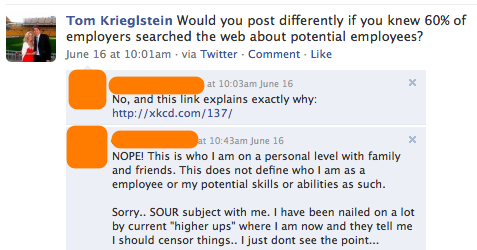Weak Ties Get You the Job

In 1973, Mark Granovetter, a sociological researcher made a simple claim, that “….when it comes to finding out about new jobs – or, for that matter, new information, or new ideas – “weak ties” are always more important than strong ties.” When using the phrase “social network” now, we tend to think about the folks […]
Learning Can Be Spontaneous and Unexpected

Spontaneous learning recently occurred for one of my resident assistants when she had to deal with a tough situation. When everyone was freaking out, she remained calmed and handled the situation by calling who she needed to call to get the individuals the help they needed. While she had been previously trained through mock situations […]
New Red Rover Feature: Get Your Follow On

Earlier this month, Tom wrote about the difference between communities based on weak ties and those built on stronger, face-to-face interactions. The strong-tie groups have a longevity that comes from the real-world relationships between members, while groups that are based on weak ties can form easily, but dissolve just as quickly if the members don’t […]
Beyond the Classroom: An Interview with Nic Ford

Nic Ford is a sophomore at Lewis-Clark State College in Idaho, and is a member of the Red Rover Ground Team. He’s working toward a career in Marketing, and has big plans for his campus radio station this fall. Check out Nic’s design work at Nicography.net. Nic spoke with us about using tools like the […]
Guiding Principles – Part 1

Our Wikispace reminds me of my over stuffed parents’ attic. Among all the “once cool/relevant but now outdated” stuff are gems that got lost in the noise. In the process of updating a few Wiki pages, I stumbled upon our “Guiding Principles” page and, in rereading, realized it’s well worth exposing to the light once […]
The Value of Integrating Social Media into Education

Dean Long, of LAUS, only needs two minutes to perfectly explain how every educator should be thinking about social media. VIDEO FILE NO LONGER AVAILABLE And if your life is too busy for a two-minute interlude, here are the highlights: Use SM (Social Media) to cultivate a community around the activities already being done on […]
Your New Best Friend, Social Networking in the First Year Experience (Part 3)

A values debate that might lead to learning, about what is useful or appropriate, gets confused with simple fight about control of technology. High schools ban cell phones. Higher education fumes about behaviors it sees as unwarranted risk, unjustified by student benefits that are often dismissed as “not real”. Overvaluing control, prevents the institution from recognizing other possible institutional values, like connection and mentoring, in the new technology.
Facebook and The Adolescent Brain – The Emerging Employers’ Dilemma

Two weeks ago, I asked my Facebook followers if they’d post differently knowing that 60% of employers search the web when considering potential employees. Several students came back with strongly worded annoyances about not wanting to change their online behavior: Then my adult friends chimed in: Though we were talking about online behavior, the difference […]
Orientation Before Orientation: The New Work of First Year Social Network Development

We exist in overlapping, intertwined social networks: family, friends, neighbors, church groups, hobby acquaintances, Christmas card friends, etc., etc. It’s an old human thing, we’ve always been that way. We get emotional well-being from close family and friends. We get growth from topic groups. We need well-being first, then growth, it’s Maslow’s hierarchy. When a […]
Is Facebook Making My Brain Bigger?

We mammals have a unique part of our brain called the neocortex that separates us from every other animal on the planet. Among mammals, neocortex sizes vary greatly and humans having the largest neocortex. The research is still not yet definitive as to why humans are the largest. The most popular theory, created by biologist […]